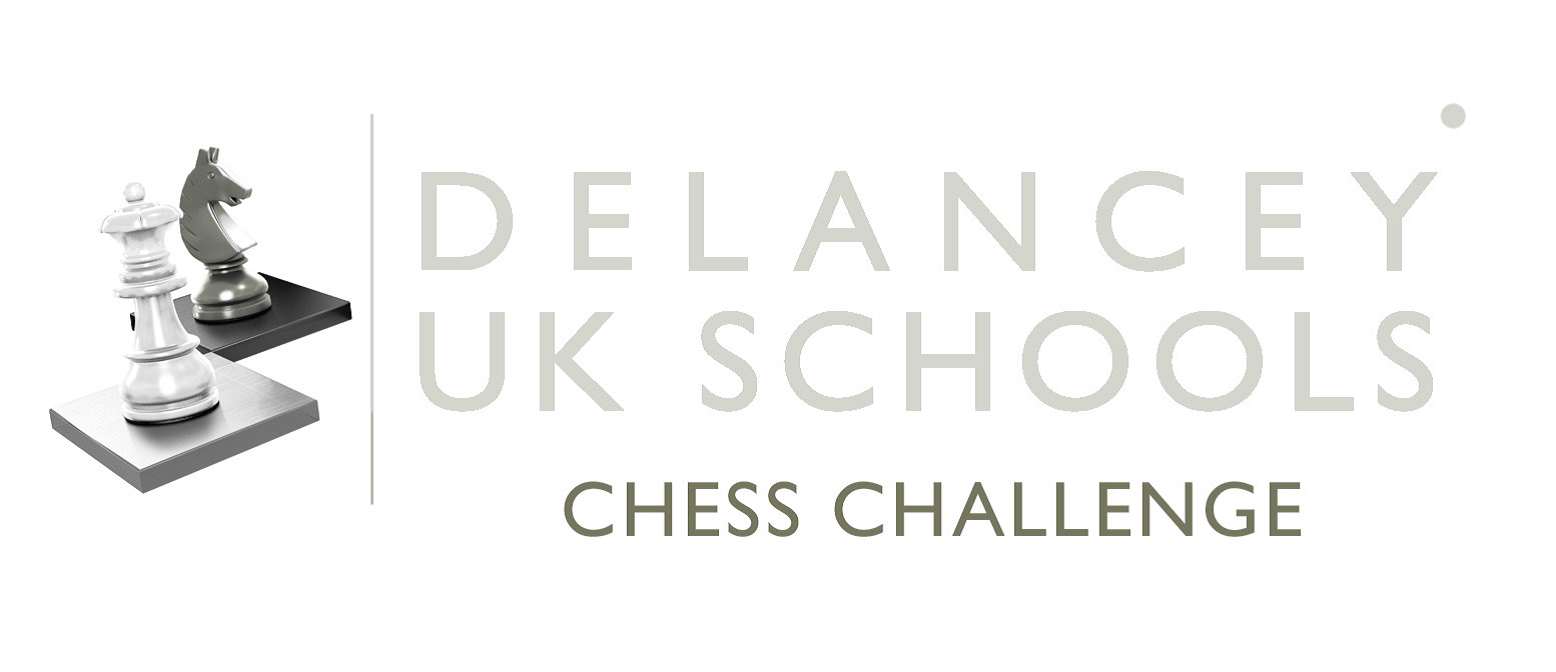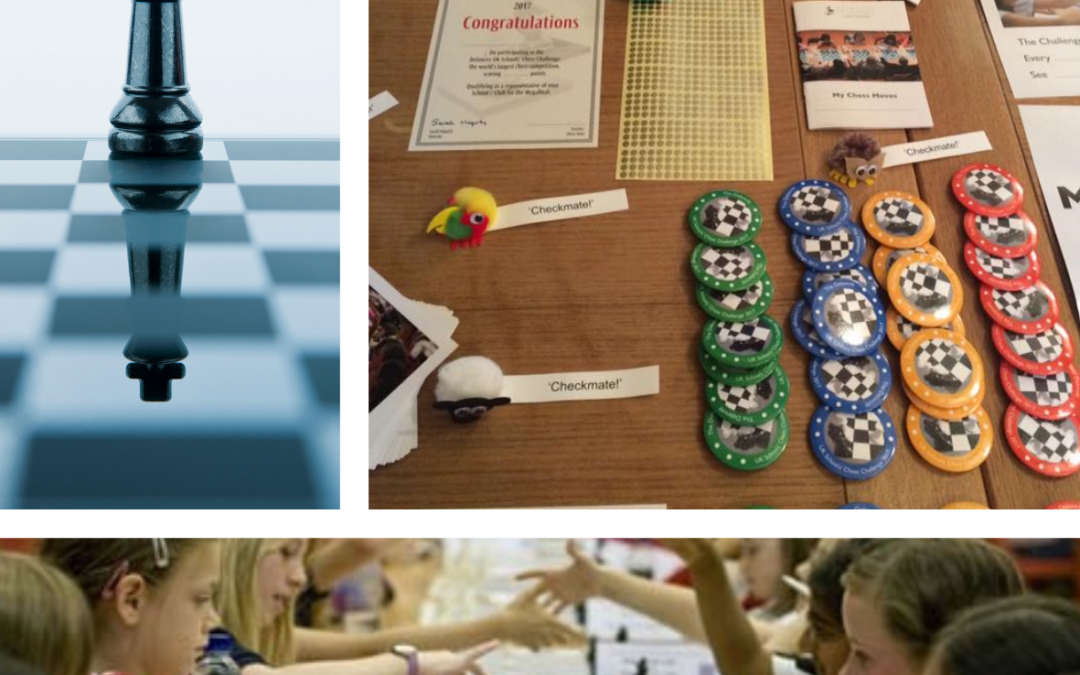About the UK Chess Challenge
Established in 1996 the Delancey UK Chess Challenge is the UK’s largest chess competition. It is for UK based juniors aged 5-18 of all abilities, whether just starting out in the game or seasoned junior internationals. It is designed to be very beginner friendly in the early stages with prizes and certificates for all participants but once we get down to the Terafinal (the final stage) only the very strongest are left standing.
UK Chess Challenge Overview
The UK Chess Challenge is an annual multi-stage event with four stages:
Stage 1) Preliminary – Schools’ Stage > Spring Term
Stage 2) Megafinals (quarterfinals) > March – June
Stage 3) Gigafinals (semifinals) > July – August
Stage 4) Terafinal (final) > September
There are five age-group sections (under 8s, under 10s, under 12s, under 14s, under 18s). Players play in their age group throughout each stage of the competition.
Each stage gets progressively harder with only the top junior players reaching the super-strong Terafinal. Prizes are available at each stage with the eventual winners being crowned UK Schools’ Chess Champions.
Stage 1 – School Competition
The Intra-School stage is always very popular amongst children who enjoy the thrill of competing against their school friends. The Intra-School tournament is supposed to be a fun and friendly introduction to competitive chess and a chance to crown your school champions.
Stage 2 – Megafinals (April – June)
* Please note that any UK based junior player can play in a Megafinal regardless of whether they competed in the schools’s stage.
The Megafinals are held regionally, often at County level, and are open to all players. Online Megafinals are also available for additional convenience. Players are now competing against peers from other schools. Regional prizes available including trophies, medals and certificates. Finish in the top half of the standings to qualify for the next stage – the Gigafinal.
Stage 3 – Gigafinals (July – August)
Things are hotting up and only the strongest chess players will survive the Gigafinals and qualify for the final round – the Terafinal. These are larger national level one-day events. Expected venues for 2024 are Sandown Racecourse (Surrey), Wright Robinson College (Manchester) and Broughton High School (Edinburgh).
Stage 4 – Terafinal (September)
The Grand Finale. This is the strongest junior chess competition of the year and it is considered a significant achievement to make it this far. Since 2021 the Terafinal was been held at the beautiful Blenheim Palace and is an ‘all play all’ event with five age group sections.
Running the School Competition
Rules
This is a seven round “swiss style” tournament which means every player plays all 7 rounds. Scoring is as follows:
- 0 points for an unauthorized absence
- 1 point for a loss
- 2 points for a draw
- 3 points for a win
How to do pairings:
“Pairings” simply means who plays who in each round.
Write the player names on the “Tournament Results” chart and allocate each player a number. Each player receives a pairing card on which their name and number is written. These are used to keep track of a players score and who they have played.
How to pair up players each round:
For round 1 this can be done randomly. For subsequent rounds you should follow these guidelines (in order of importance):
- Start by ordering the pairing cards by score – with the highest points at the top of the pile
- Start with the player with the most points – try and pair them against another player on the same number of points
- If you cannot find someone on the same number of points try and find a player with the next closest score
- A player must not play the same player more than once
- Try and ensure players rotate colours (ie if they have white in round one they should get black in round two). Players should never receive the same colour three times in a row.
- By the end of the seven rounds each player should have played four times with one colour and three times with the other.
Creating correct pairings is an art in itself and more information can be found by googling ‘how to do swiss pairings’. Don’t worry that they aren’t quite right as long as you have tried to follow the guidance above.
Recording the result
When a game is finished both players’ pairing card should be collected and the current round’s result filled in.
‘Progressive Score’ – the total score the player is on following the latest game
‘Result’ – result of the current round (W=win, L=loss, D=draw)
‘Colour’ – white or black
‘Opponent’s no.’ – who they played that round (this keeps track of who they have played so you won’t pair them against the same player again).
Frequently asked questions
Q: What happens when there is an odd number of players.
A: The player with the lowest score gets a “bye” and is awarded 3 points. Players should not receive more than one bye during the tournament
Q: What happens when it is impossible to pair ‘player A’ with another player with the same score?
A: They should be paired with someone in the next closest score group.
Q: What if a game is still in progress at the end of the session?
A: “House Rules” apply! There are various options – the most common is for the teacher to adjudicate based on who they think is ahead (for example by comparing the value of the pieces still on the board). Sometimes the players are allowed to continue the following session (make sure to take a photo of the position)!
Prize Allocation
The following is our suggestion of how to allocate prizes but many teachers have their own system for allocating prizes. Prizes are normally awarded as and when the player achieves the relevant score. The prizes are cumulative – ie players can earn more than one.
- 3 points Badge
- 4 points 1st Gold Spot (goes on the badge)
- 7 points 2nd Gold Spot
- 9 points Mascot / logobug
- 10 points 3rd Gold Spot
- 13 points 4th Gold Spot
- 15 points Lucky dip prize
- 17 points 5th Gold Spot
- 21 points 6th Gold Spot
The overall champion (or champions) in addition to the above receives the trophy. Certificates are handed out during the final session with the players score recorded for posterity.
Depending on the size of your club you might want to have year-group champions – for example best under 7 (or year 2).
Top Tip
Place the pairing cards out at the seats before the session starts so the players know where to sit. They will have fun finding their place!
Sample Term Schedule
Here is the schedule that I will be running in my schools in Cheshire:
W/C 8th January Checkmate practice and recap of tournament rules
W/C 15th January Overview of how to play the opening and avoiding Scholars Mate
W/C 22nd January Round 1
W/C 29th January Round 2
W/C 5th February Round 3
W/C 12th February Half Term / Fun Activity
W/C 19th February Half Term / Fun Activity
W/C 26th February Round 4
W/C 4th March Round 5
W/C 11th March Round 6
W/C 18th March Round 7
W/C 25th March Prize giving and certificate presentation
Players finishing their game early can be given an activity sheet to complete or encouraged to play a ‘friendly’ – perhaps with colours reversed. We have a large library of classroom activities, puzzle sheets, videos and interactive videos. Please get in touch if these are of interest.
Why Students Take Part in the Megafinals
All students who are able to play a full game of chess are eligible to play in the Megafinals. Some of the many reasons why students from all over the UK take part include:
- Represent their school in the ‘UKCC Team Competition’
- Test their skills against players from other schools
- Experience of competing in a nationwide event
- Chances of qualifying for the latter stages – even the prestigious Terafinal
- Opportunity to win prizes, medals, trophies and certificates
How to take part in the Megafinals
The Megafinals take place from April through to June each year. There are over the board Megafinals across the UK but we also run some online versions for those who are unable to attend in person.
There are two ways to register:
1) Parents register and pay directly via the website. This is the most common method.
2) Schools/Clubs purchase a bulk entry for their students. This can attract a significant discount if the school is able to pay for the entry or they are able to raise the funds directly from parents. Please get in touch if this is your preferred option.
If you or your school are interested in running or hosting a Megafinal please get in touch. There are a range of ways we can support you to run a local event.
Contacting Us
Website: www.delanceyukschoolschesschallenge.com
Email: admin@ukchess.co.uk
You have been subscribed to our regular newsletter which contains updates about the competition as well as ideas for chess club activities and some puzzles and challenges for the students.
Follow us
Please follow our social media channels to keep in the loop with the latest competition news.
https://www.facebook.com/DelanceyUKSchoolsChessChallenge
https://twitter.com/delancey_ukcc
Sarah Longson
CEO, UK Chess Challenge

